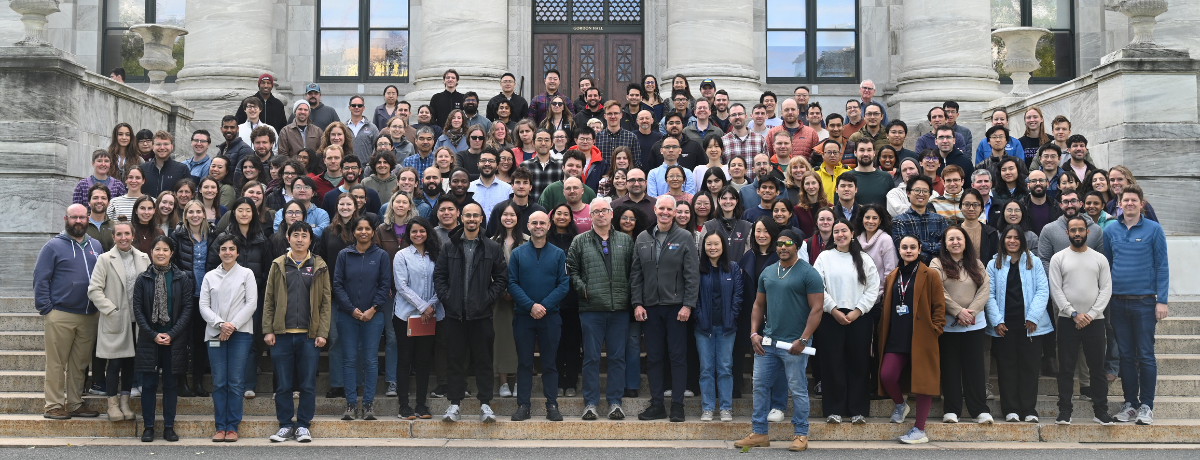Our Mission
Cell Bio at HMS is where innovative approaches are used to unravel the mysteries of cellular machines and organismal physiology, where barriers to mechanistic understanding are broken, and where diverse scientists are supported in an inclusive environment of learning, scholarship, and collaboration.
Cell Bio by the Numbers
- ~370 faculty, staff, postdocs, students, and affiliates
- ~40 graduate students
- 8 endowed professorships
- Bradley Bernstein, Joan Brugge, Wade Harper, Randy King, Tomas Kirchhausen, David Pellman, Tom Rapoport, and Bruce Spiegelman
- 6 active HHMI investigators
- Ed Chouchani, Steve Liberles, Danesh Moazed, David Pellman, Tom Rapoport, and Susan Shao
- 10 active Fellows of the Academy of Arts and Sciences
- Spyros Artavanis-Tsakonas, Joan Brugge, Lew Cantley, Dan Finley, Wade Harper, Tomas Kirchhausen, Danesh Moazed, David Pellman, Tom Rapoport, and Bruce Spiegelman
- 3 active Fellows of the American Society for Cell Biology
- Joan Brugge, David Pellman, and Tom Rapoport
- 6 active Members of the National Academy of Medicine
- Bradley Bernstein, Joan Brugge, Lew Cantley, Marica Haigis, David Pellman, and Bruce Spiegelman
- 7 active Members of the National Academy of Sciences
- Spyros Artavanis-Tsakonas, Joan Brugge, Lew Cantley, Wade Harper, Danesh Moazed, Tom Rapoport, and Bruce Spiegelman
5 centers, cores, facilities, & initiatives
Our History
Today's Department of Cell Biology was created in 1993, after the merger of two departments: Anatomy & Cellular Biology and Cellular & Molecular Physiology. Anatomy & Cellular Biology had been chaired by Betty Hay since 1975, while the Cellular & Molecular Physiology department had been led by Howard Green since 1980. Both Betty and Howard continued to carry out their research in the newly formed department until their retirements in 2005 and 2015, respectively. Today's faculty includes several members hailing from the original anatomy and physiology departments: Dan Finley, John Flanagan, Tomas Kirchhausen, and Malcolm Whitman.
Cell Biology's inaugural chair was Marc Kirschner, who served until he stepped down to create the Department of Systems Biology in 2003. Under Marc's leadership, numerous new junior and senior faculty were recruited, including current members Spyros Artavanis-Tsakonas, Joan Brugge, Steve Gygi, Randy King, Danesh Moazed, Tom Rapoport, Bruce Spiegelman, and Davie Van Vactor.
Cell Biology's second department chair was Joan Brugge, who was appointed interim chair in 2003 and served as chair from 2004 to 2014. Current faculty members Nika Danial, Marcia Haigis, Wade Harper, Steve Liberles, David Pellman, Pere Puigserver, and Adrian Salic were all hired and recruited under Joan's watch. In 2014, Joan stepped down to become the Co-Director of the Ludwig Center at Harvard Medical School and was succeeded by Wade Harper. Since then, our department has welcomed several faculty members: Susan Shao (2016), Ed Chouchani (2017), Amy Lee (2020) and Lucas Farnung (2021). In Fall of 2024, we welcomed Corey Allard, Xin Gu, and Rachel Wolfson.
Our Research and Educational Priorities
Over these past three decades, Cell Bio at HMS has established itself as a premier department worldwide. The national and international standing of our department reflects a strong commitment to excellence in faculty recruitment and promotion, significant investment in cutting-edge technology, and efforts to build and maintain a vibrant and collaborative community. Through fundamental discoveries of molecular mechanisms, we strive to explain how cells perform their essential functions. Additionally, many of our faculty are dedicated to translating their discoveries for therapeutic benefit.
We also recognize that new discoveries are made at the leading edge of technological development, so we prioritize efforts to be at the forefront of innovations that allow the analysis of cells and molecules at increasingly higher spatial and temporal resolution. Our department created numerous core faciliites that continue to be used by the entire local research community, including the ICCB-Longwood Screening Facility (1998), Core for Imaging Technology & Education (CITE) (formerly the Nikon Imaging Center, 2001), Taplin Mass Spectrometry Facility (2001), Thermo Center for Multiplex Proteomics at Harvard (2014), and the Cell Biology Microscopy Facility (2015).The rapid evolution of imaging, proteomic, and gene-editing approaches is leading to dramatic improvements in our ability to query gene function in cells and animals and reconstituted systems in vitro.
In addition to these research objectives, our faculty play leadership roles in training the next generation of research scientists and physicians at HMS and beyond, through innovative graduate, postdoctoral, and medical training programs. Our flagship graduate level course (CB201) has been a mainstay of graduate education for years, and we have the oldest (now in year 45) and largest NIH T32 training grant on the HMS campus. Cell Biology has also played an important role in the creation of several graduate programs, including: (1) the Biological and Biomedical Sciences (BBS) umbrella graduate program; (2) the interdepartmental Developmental and Regenerative Biology (DRB) program; and (3) the collaborative effort to form a Harvard-wide consortium in Cancer Biology training. Faculty in the department also play important roles in the Dana Farber/Harvard Cancer Center (DF/HCC) through involvement and leadership of the Cancer Cell Biology Program, one of 3 basic science efforts within the DF/HCC. We have also contributed to the creation of the Curriculum Fellows Program (CFP), a postdoctoral training program for those interested in pursuing teaching careers, and we also develop new educational formats, including Nanocourses, a mechanism for teaching advanced research topics and methodologies.
For over 20 years, our department played an instrumental role in the New Pathway medical student curriculum, which sought to integrate cell biology and biochemistry with disease. In particular, our faculty taught in "Molecular and Cellular Basis of Medicine (MCM)", which was one of the highest rated courses for medical students. Our faculty also played critical leadership roles in the 2015 effort to completely reimagine medical education through the development of the Foundations and Advanced Integrated Science Courses within the Pathways curriculum.
